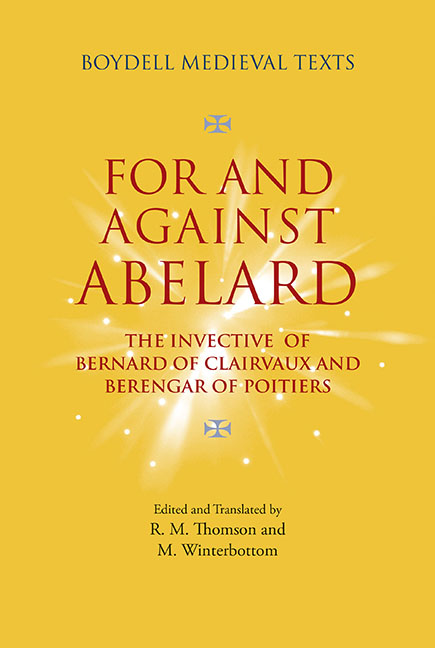Introduction
Published online by Cambridge University Press: 23 October 2020
Summary
On 2 June 1140 or, more probably 25 May 1141, the Council of Sens was held. Originally called by Archbishop Henry in order to solemnly display the relics of Saint Stephen and to deal with a few other minor matters, no other event could more arrestingly show the importance of clerical intellectuals in the Western European culture of the time, or the power of their writing. The Council did not enact reforming legislation; in fact, it was as famous for what it did not do as for what it was expected to do. Around it swirled a flurry of mandatory and condemnatory rhetoric, mainly from the pen of the most persuasive and, in some ways the most conservative, churchman of the day: Bernard of Clairvaux.
In 1140 William of Saint Thierry, abbot of Cistercian Signy, a close friend of Bernard, had begun to read some works of Peter Abelard, notably his Theologia ‘Scholarium’ and Sententiae; his reaction to these works was so negative that in Lent of that year he wrote both to Bernard and to the papal legate in France, Geoffrey, bishop of Chartres, warning them of the threat posed by Abelard's doctrines. He sent them the text of the two works to which he objected, and his own Disputatio criticising them. Bernard was so perturbed by the content of these that he began, in effect, a pamphlet war against Abelard, addressed to the pope and sundry cardinals. In reaction, Abelard appealed to Henry Sanglier, archbishop of Sens, calling for a council at which he could clear his name in debate with Bernard. As mentioned, a council was already imminent, and the great and good of the French Church and realm, from the king down, were to be present. But at that place, when the charges were read out, Abelard refused to debate them, instead appealing to Rome. The proceedings of the Council were halted, and modern historians have wondered why the experienced and charismatic theologian, then in his early sixties, refused this chance to show his prowess.
- Type
- Chapter
- Information
- For and Against AbelardThe Invective of Bernard of Clairvaux and Berengar of Poitiers, pp. xi - xxxiiPublisher: Boydell & BrewerPrint publication year: 2020



